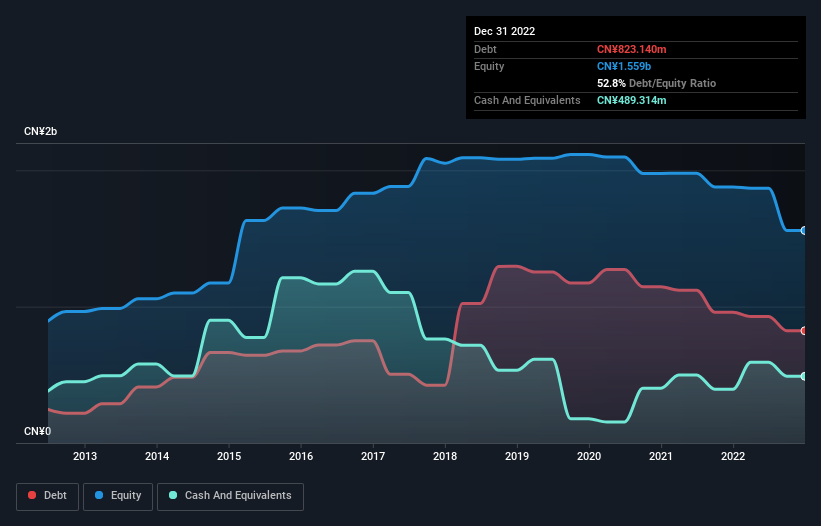- Hong Kong
- /
- Electronic Equipment and Components
- /
- SEHK:1708
Nanjing Sample Technology (HKG:1708) Is Making Moderate Use Of Debt
The external fund manager backed by Berkshire Hathaway's Charlie Munger, Li Lu, makes no bones about it when he says 'The biggest investment risk is not the volatility of prices, but whether you will suffer a permanent loss of capital.' So it seems the smart money knows that debt - which is usually involved in bankruptcies - is a very important factor, when you assess how risky a company is. Importantly, Nanjing Sample Technology Company Limited (HKG:1708) does carry debt. But the more important question is: how much risk is that debt creating?
When Is Debt Dangerous?
Generally speaking, debt only becomes a real problem when a company can't easily pay it off, either by raising capital or with its own cash flow. If things get really bad, the lenders can take control of the business. However, a more common (but still painful) scenario is that it has to raise new equity capital at a low price, thus permanently diluting shareholders. Having said that, the most common situation is where a company manages its debt reasonably well - and to its own advantage. When we examine debt levels, we first consider both cash and debt levels, together.
Check out our latest analysis for Nanjing Sample Technology
What Is Nanjing Sample Technology's Net Debt?
You can click the graphic below for the historical numbers, but it shows that Nanjing Sample Technology had CN¥823.1m of debt in December 2022, down from CN¥959.1m, one year before. However, it does have CN¥489.3m in cash offsetting this, leading to net debt of about CN¥333.8m.

How Healthy Is Nanjing Sample Technology's Balance Sheet?
According to the last reported balance sheet, Nanjing Sample Technology had liabilities of CN¥1.33b due within 12 months, and liabilities of CN¥111.7m due beyond 12 months. On the other hand, it had cash of CN¥489.3m and CN¥1.16b worth of receivables due within a year. So it actually has CN¥211.4m more liquid assets than total liabilities.
This surplus suggests that Nanjing Sample Technology has a conservative balance sheet, and could probably eliminate its debt without much difficulty. There's no doubt that we learn most about debt from the balance sheet. But it is Nanjing Sample Technology's earnings that will influence how the balance sheet holds up in the future. So when considering debt, it's definitely worth looking at the earnings trend. Click here for an interactive snapshot.
In the last year Nanjing Sample Technology had a loss before interest and tax, and actually shrunk its revenue by 44%, to CN¥513m. That makes us nervous, to say the least.
Caveat Emptor
While Nanjing Sample Technology's falling revenue is about as heartwarming as a wet blanket, arguably its earnings before interest and tax (EBIT) loss is even less appealing. Indeed, it lost CN¥164m at the EBIT level. Looking on the brighter side, the business has adequate liquid assets, which give it time to grow and develop before its debt becomes a near-term issue. But a profit would do more to inspire us to research the business more closely. This one is a bit too risky for our liking. There's no doubt that we learn most about debt from the balance sheet. But ultimately, every company can contain risks that exist outside of the balance sheet. Be aware that Nanjing Sample Technology is showing 1 warning sign in our investment analysis , you should know about...
At the end of the day, it's often better to focus on companies that are free from net debt. You can access our special list of such companies (all with a track record of profit growth). It's free.
Valuation is complex, but we're here to simplify it.
Discover if Nanjing Sample Technology might be undervalued or overvalued with our detailed analysis, featuring fair value estimates, potential risks, dividends, insider trades, and its financial condition.
Access Free AnalysisHave feedback on this article? Concerned about the content? Get in touch with us directly. Alternatively, email editorial-team (at) simplywallst.com.
This article by Simply Wall St is general in nature. We provide commentary based on historical data and analyst forecasts only using an unbiased methodology and our articles are not intended to be financial advice. It does not constitute a recommendation to buy or sell any stock, and does not take account of your objectives, or your financial situation. We aim to bring you long-term focused analysis driven by fundamental data. Note that our analysis may not factor in the latest price-sensitive company announcements or qualitative material. Simply Wall St has no position in any stocks mentioned.
About SEHK:1708
Nanjing Sample Technology
Provides visual identification and radio frequency identification (RFID) solutions to intelligent transportation, customs logistics, and other application areas in the People’s Republic of China.
Adequate balance sheet with very low risk.
Similar Companies
Market Insights
Weekly Picks

Solutions by stc: 34% Upside in Saudi's Digital Transformation Leader


The AI Infrastructure Giant Grows Into Its Valuation
Recently Updated Narratives
Many trends acting at the same time


Engineered for Stability. Positioned for Growth.


Staggered by dilution; positions for growth
Popular Narratives


MicroVision will explode future revenue by 380.37% with a vision towards success


NVDA: Expanding AI Demand Will Drive Major Data Center Investments Through 2026



